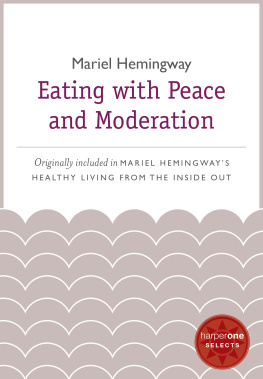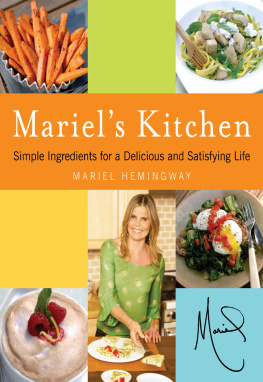Question: Which statement best reflects your attitude toward food?
A. I love to eat, and I often find myself thinking about foodto the point where it sometimes causes a problem of overeating or denial.
B. Feeding myself is a time-consuming chore. If nutrition came in capsule form, Id take it!
C. I can get excited about eating sometimes, but my attitude toward my daily diet is pretty utilitarian.
THE WAY YOU EAT is just as important as what you eat. The act of eating should provide a moment of respite during your day. After all, eating is the most fundamental act of taking care of yourself. While choosing nutritious, whole foods is one aspect of eating well, learning how to treat food with the consideration and respect it deservescreating a good eating experience, whether alone or with your familyis equally crucial. Only when your attitude toward eating changes can food truly become one of the cornerstones of the balanced lifesomething that positively affects your life and brings you not just health but also pleasure and peace of mind.
You should be able to eat in such a way that food makes you happy, not anxious, each day and so that you feel satisfied after every meal. If you are rushed, distracted, or fighting yourself over your desires, you wont get as much goodness from your food no matter how well chosen it is.
Good eating is about moderation. Occasionally eating imperfect foods is not the problem; its overindulging in those foods thats the problem. Its time to shift to the way our predecessors ate: their diets included some sugar, some carbs, and certainly some good fats, but none of it was supplied in the vast amounts available to us today. Plus, their diets usually maintained active, physical lifestyles rather than sedentary ones. In my household the one person who ate moderately was my mother; she had her eggs and toast in the morning; her meat, salad, and baked potato at lunch; her cup of coffee and maybe one cookie or a sliver of pie in the afternoon. It was simple, homemade fare, and she never needed more than the moderate portions she served. Though she had her problems (her alcohol consumption was not quite as limited), she did not use food for emotional purposes; it all seemed so straightforward for her.
Thats why the most important message about food is to eat moderately with awareness. Its not enough to simply say, Eat less and still have your chocolate cake on Friday. You need to get to a neutral territory first. Thats why reducing the noisy, addictive bad foods entirely for several weeks is so helpful. It rebalances your chemistry and palette so you eat less and start to discern whats really in your food; meanwhile, adding healthful foods will satisfy your hunger at a deep level. Now youve got a healthy clean slate onto which to add a treat here and there as a deliberate choice: it should be something special. Delicious treats are on the planet for a reasonbut while theyre exciting when eaten occasionally, theyre polluting when eaten every day.
Taking some time to investigate not just what you eat but also how and why you eat makes moderation more achievable. Pausing long enough to look inward each time you are hungry can shed light on why you make poor choices. When your new repertoire of foods is combined with self-knowledge and self-acceptance, healthy eating becomes simple, pleasurable, and sustainable.
Eating with Peace: The Ritual of Food
Question: What is happening around you when you eat?
A. The TV is on (whether Im watching it or not), or Im listening to music, or I am reading something, or Im at my computer.
B. Various family members or roommates drift in and out at different times, sometimes sitting down to join me, other times not.
C. I frequently find myself standing at my kitchen counter eating because Ive gotten distracted by something else, like talking on the phone.
D. Im sitting quietly enjoying a meal with someone I love.
HOW CAN WE GET MUCH GOOD from our food when we treat it like we expect so little from it? In many cultures eating is an important ritual: by preparing and consuming food deliberately and even reverentially, people acknowledge the food before them, bless it, and appreciate the energy it is giving them. Mealtimes become moments to pause, take stock of their lives, and commit to the act of self-care. Instead of being a chore or a drag, eating becomes a daily ritual that can anchor a person more firmly into their life.
Thats why its such a shame that in our modern, fast-paced lives, weve lost track of how we eat. Instead of being a calm and deliberate act, a meal is often squeezed in on the go. Instead of appreciating the food, we often barely notice it as we eat, or we struggle with it, feeling guilty about it or maybe wishing it were something else. Bringing food back into focus is integral to finding balance through eating. For four weeks, youre going to agree to refrain from watching TV, reading, or working while you eat. Youre going to put some time into laying the table and presenting your food beautifully, even if youre eating alone. Youre even going to do the preparation and cleanup with a more creative and calm perspective. The idea is in small ways to make the act of eating more meaningful.
Bringing this attitude to food makes it hard to overeat and overindulge: you take a moment to decide in advance how much you will consume. You notice how the food is affecting you as youre eating it, and you notice when youre satisfied. The relationship between you and your food grows closeryou know exactly why youre eating instead of confusing the purpose by making food fill emotional needs. Much of the time we consume too much because were not present.
Question: If youre almost surprised when the food on your plate is finished, how much of your meal did you notice?
If your attention was not there, did you get as much nourishment as you could have?
The ABCs of Peaceful Eating
A. Put love into your food.
If food is made with care, it changes. Try to plan in advance so you give yourself enough time to prepare the food without rushing. If you plan well, you can go from one food prep activity to the next being aware and conscious of each step, and the act of preparing food becomes more creative and rewarding. As a wife and mom, I can find satisfaction in feeling that Im doing service for my familyif I take the time to tune in to what Im doing. The dish doesnt have to be gourmetit can be the simplest foodbut if done with consideration, it carries an energetic message into the meal. It feeds you and your tablemates with more than just nutrients. Thats why it pays to avoid the microwave and know in advance what youre going to cook each night.
B. Present meals like they matter.
After cooking, take two extra minutes to lay food beautifully on platters or plates, even if its just for you or for you plus one other person. I sometimes decorate the platters: a flower grabbed from outside sits next to slices of seared fish, or curls of orange carrot next to slices of tofu. I juxtapose colors and textures and arrange foods in neat ways. It pleases the artist in me to pay attention to how the food looks all together. As my family dinners often include separate plates and bowls, it is a good opportunity to make a meal look colorful and appealing or use fun serving utensils. When you put consideration into all these details as you serve a meal, you bring the focus to the moment and make even a daily act more significant.
C. Make mealtime meaningful.
Do you have a dining room table or a kitchen table? Its there because youre supposed to sit at it to eat, whether alone, with friends, or with your family. If you dont have a table dedicated to eating, then might you make a space in your home that is devoted to meals? I spend five minutes to lay the table while the food is cooking. I put out a place setting for each person, including mats and napkins, and I fill a water glass for each person. I put something in the middle of the table: a potted plant or some flowers if I have them. The dogs get locked outside, and the TV in the living room is switched off so we cant hear it. Phone calls do not get answered. Lunchtime, when Im home alone, is often a time for me to sit and reflect. Dinnertime is a chance to connect with my husband and kids and sometimes with friends. Life rushes by so quickly that if we dont sit around a table, our days could go by with minimal communication. If youre a parent, I believe that you lose track of your kids if you dont once in a while sit down at the table and have those family talks. It may be unrealistic to do it every night, but perhaps one day a week you could alert the kids in advance: Tonight, guys, were eating together.









